- Home
- Mark Wayne McGinnis
Boy Gone Page 3
Boy Gone Read online
Page 3
Landon cut in, “It’s a vessel, Houston! I can see it now. It’s a damn UFO of some kind! Peter, I want you back in here. Now!”
Chapter 6
He was startled awake as the police cruiser’s side door he was cozied up against was abruptly jerked open. Nearly toppling out—big hands were there to grab him. Gazing up through half-opened eyelids, he caught sight of the portly man in blue. Who is he, again? Although his mind had definitely cleared up some, it still took a few beats to remember. It was the one who had attacked him—the policeman. The one called Officer Donald Platt.
At that moment, Platt was glaring down at him. Suddenly, he was yanked up, both hard and fast, out of the cruiser’s rear seat. His head began to pound from the rough treatment, with hot bile burning the back of his throat. He felt nauseous.
Catching his breath, just above a whisper he asked, “Where are we going?”
“So now you want to talk? Little late for that, dirt bag,” Platt shot back, as he half-shoved, half-dragged him in through automatic double-glass doors. They next continued down a narrow hallway and into a medium-sized room, with polished linoleum tiled floors and pale-blue painted walls. Platt plunked him down onto one of the three metal stools lined-up in front of a counter with a short Plexiglas partition. Platt un-cuffed his arms from behind his back then re-cuffed his right hand to a waist-high metal railing. He felt the cold metal stool beneath his bare buttocks—against his exposed testicles.
“To answer your question, dirt bag, I’m booking you into this here fine, five-star hotel establishment. Make sure you ring for the complimentary room service.”
Blurry-eyed, he tracked Platt as he moved behind the Formica counter. Placing his hands on his wide hips, Platt looked around. “Yo, yo, yo … anyone working the desk tonight?”
A silver-haired man, with piercing blue eyes, peered out through a glass door on the opposite side of the room. Throwing out an annoyed glare as he pulled the door all the way open, he just stood there, garbed in a crisp, navy-blue uniform. Little gold stars decorated his shirt collars; his shiny badge reflected the overhead florescent lights. First glancing through the clear counter partition at him, then over to Platt, he asked, “Why is there a naked, bloodied man sitting in my booking room?”
“Hey, Cap.”
“No! I’m Captain Brooks, not, ‘Hey, Cap.’”
“Oh … yeah, sorry. No disrespect intended. Anyway, Captain Brooks, I answered a last-minute call tonight—a 10-56. Came right at the end of my shift. Guy over there was sprawled out, buck naked, lying off in the dunes. Neighbors all in a tizzy about it.”
Captain Brooks stared back at Platt blank faced. He then came around the counter and looked down at him. With a creased brow, he leaned in a little closer. The captain touched the side of his bloodied face, probing it with his two extended fingers.
“Ahh!” the prisoner inhaled sharply, feeling renewed, searing pain.
“How did these injuries occur?”
Platt said, “Yes, sir. The perp needed to be restrained after he went for my gun. Had to give him a couple of whacks to settle him down.”
“Officer Platt … please come with me,” the police captain said, standing upright. He then purposely moved back behind the counter and disappeared through the still-open doorway.
Platt narrowed his eyes at the naked man. “Don’t you go anywhere.” He gave the man’s secured wrist a few unnecessary tugs, then followed in the captain’s steps out of the room.
The door remained open and the prisoner could still see Platt, but not the police captain, though he could still make out their hushed voices. “I think that man out there has a broken cheekbone! Could be his orbital bone. His lip is split in two places, and he very well could have a concussion. What the hell were you thinking?”
“He was a wild bull at the time … maybe hopped-up on something. Probably ecstacy. To be honest, I feared for my life,” Platt said, adding a well-timed wince to emphasize his point.
“Goddammit, Platt! I’ll deal with you later.” Looking furious, the captain stormed back through the open door, then made his way over to the prisoner. Platt, almost leisurely, followed behind him.
Kneeling down, placing a hand on the prisoner’s shoulder, the police captain asked, “Hey … what’s your name, mister?”
The prisoner thought about that. “I … I don’t … remember.” Then he did recall something, something from his distant past. He remembered a woman’s voice, his mother calling to him, and then again, but much more recently. “Wait, it might be … Scotty. I think I remember being called Scotty.” He glanced up at the captain questioningly.
“Come on! Full-grown man like that and his name is Scotty?” Platt said, rolling his eyes.
“So, you’ve been drinking a bit tonight, that right, Scotty? Partying it up? Maybe you took some drugs, too? What exactly did you take?” the captain asked.
He thought about being called Scotty. It felt fine. It felt right. Almost imperceptibly, he shook his head. “No drugs. Nothing to drink.”
The captain, standing all the way up, glanced over to Platt. “There’s no nystagmus occurring with his eyes … the jiggling back and forth of the eyes you see with ecstasy users. And although his breath is beyond foul, I smell no alcohol.”
Officer Platt nodded then shrugged. “Must be something else, then.”
“Did you think to cover him up—put a blanket over his shoulders? You know there’s one in every cruiser’s trunk.”
“Nah, Cap … um, Captain Brooks. With all the ruckus, I was lucky to even get him cuffed and secured inside the car.”
The captain continued to stare at Platt, then down at Scotty again. “Here’s what you’re going to do. Take him through the booking process; print him and get pictures taken. Also, get a DNA swab of his cheek, then get him into a clean jumpsuit.”
Officer Platt, already vigorously shaking his head, to the point his double chin was flapping from side-to-side, said, “Captain, I’m totally beat—my shift ended over an hour ago … ”
Captain Brooks continued, “After that, I want this man transported over to Nantucket Cottage Hospital for further evaluation. Have I made myself clear what is expected of you, officer?”
“I understand what you’re saying, Captain, sure. But I don’t understand why Ellis or Kaplan can’t handle this now? They’re on duty, I’m not.”
“You’re on duty as long as I say you’re on duty. We have limited night-duty staffing here, as you well know. Ellis is already on patrol and Kaplan won’t be in till his 5:00 a.m. shift starts later today. But, even more importantly, since you were the cop who beat this man so viciously into submission, you’ll be the one to take him over to NCH for evaluation and treatment. I’ll run his prints to see if anything shows up regarding his identity. Officer Platt, you will treat this prisoner with respect. Don’t let me find out he’s been any further abused.”
“Yes, sir.”
Platt came closer and began to unlock Scotty’s cuffs. Scotty kept his eyes on the captain then turned his attention to the small rectangular device secured to Platt’s chest. Scotty pointed at it with his free hand.
Captain Brooks pursed his lips. “One more thing, Platt … did you initialize your body cam upon arriving at the scene?”
Platt fumbled with the cuffs, eventually getting them ratcheted closed behind Scotty’s back, then hefted him up to his feet before answering, “I’m just not used to the damn things, Captain. We didn’t have much in the way of modern police technology at my last assignment. Sorry, sir”
“All right, I’m going to have to write you up, Platt. The problem is, you’ve already been skating on thin ice around here.” The captain moved in closer, reaching out a hand to touch the middle of Platt’s chest, and switched his body camera on. “That stays on till you’ve clocked out. Just know I’ll be able to watch all your movements, in real-time, via the cloud. Now get going.” Captain Brooks made momentary eye contact with Scotty, “We’ll get things fig
ured out, young man,” giving him a quick, reassuring nod.
Chapter 7
FBI Special Agent Alison McGuire sat in her car, located within the below- deck parking structure of the Hyannis to Nantucket ferry. Cool and dark here, but most of all, thankfully quiet. She momentarily closed her eyes and breathed in the smell of the sea.
She was using the ferry’s one-hour crossing time to catch-up on seemingly endless interdepartmental emails. How does anyone get anything done in this job?
Glancing up from her iPhone, Alison caught sight of the distant, sandy-colored patch of land just coming into view through a narrow opening on the side of the ferry. She hadn’t been back to Nantucket Island since she was fourteen and her feelings were mixed about coming back. Excited, because this was her first solo FBI bureau assignment, but somewhat saddened too. It was here, on that last mid-summer visit eleven years ago that her father—bodysurfing right beside her—suffered a massive heart attack. Dropped dead trying to make it to shore. But she didn’t want to think about that, certainly not right now.
Alison reached for the manila file folder, laying on the passenger seat. Upon opening it, she leaned it up against the steering wheel, then placed the envelope with the subject’s prelim DNA results at the very back of the folder. She’d already read the case file twice; had inserted a number of small notes within both margins. Scotty Sullivan, Caucasian male, was nine years of age when he went missing, late one afternoon while on a family vacation.
His disappearance, reportedly, took place close to the beachside vacation home of his parents, Andrew and Brianna Sullivan. Andrew was a financially well-off day-trader for Goldman Sachs, and she a stay-at-home mother to three children: Kyle, eleven, the oldest child; Scotty, nine, the middle child; and Sara, their three-year-old daughter. According to the mother, Scotty was wearing rolled-up jeans and a tank top. Also, their dog, Larry, was outside with him. Late in the afternoon, it was already starting to get dark outside. The mother had told Scotty to be back inside the house within a half-hour. She remembered seeing clouds and the wind picking up outside the kitchen window. Temperatures along the New England coast had cooled, but Scotty was insistent about wanting to play outside—if only for a little while. And that was the last time that anyone ever saw the young boy.
The police were called and within two hours, an extensive search had ensued. All available police officers, a number estimated to be around twenty-five, scoured acres of nearby dense scrub oak which bordered the exclusive neighborhood homes in the area, and also along the southeastern Nantucket shoreline. But nothing turned up. Scotty’s footprints, as well as Larry’s, the dog, were found, leading down to the beach, but found nowhere else.
Island authorities checked the small local airport, as well as the Steamship Authority, to see if a young child matching his description had accompanied anyone on a departing flight or aboard any of the leaving ferries. Personnel at Nantucket Cottage Hospital were also interviewed; on the chance someone had taken him there. They checked if a boy matching his description had been admitted, but still nothing showed up. The search expanded into the moors, to Polpis Road and Sankaty, and out to the cranberry bogs. By noon the following day, a Coast Guard helicopter was dispatched to assist the growing search team on the ground. It now included State Police troopers and Island firefighters. For close to a week, there was a non-stop search of Nantucket Island by up to sixty-five public safety personnel. They covered the entire island, much of it on foot, checking unoccupied houses, and even closed retail establishments. Numerous attempts to send dive teams into the frigid waters along the coast were hampered by the turbulent seas. By then, the FBI had assumed full control of the search and investigation. Investigators found no signs of foul play and, after three months, concluded that both dog and boy had been swept out to sea. The file would be kept open, just in case, but no one expected to hear anything further about the missing boy.
Paper-clipped to the folder was a snapshot of a smiling, nine-year-old Scotty Sullivan that looked to be a school picture. Cute kid, Alison thought. Another snapshot was paper-clipped right next to it. This one was of a bare-chested, full-grown man with unkempt blonde hair. The side of his face was swollen showing clear signs of recent trauma. Clearly, someone had beaten the shit out of the guy. Thumbing through the file pages, she stopped at a page holding multiple fingerprint images and leaned in closer. She studied one of the circled sections, which matched to an adjacent set of prints. The boy, Scotty, and the young man’s prints seemed to be similar. But matching fingerprints of children with their potentially older selves had been known to be problematic. But still, this match up was compelling—at least to her it was. She flipped to the front of the folder again, looking back and forth between both of the snapshot faces. She said aloud, “You could be the same guy, I guess.”
Prior to heading out that morning, making the four-hour drive from the Chelsea, Massachusetts FBI office where she worked, Alison’s supervising agent, Donald Price, gave her one full day to get all this bullshit kicked to the curb, as he had off-handedly exclaimed. He was convinced that there was no possible way, after sixteen years, for a missing kid to just suddenly, miraculously, show up again in practically the same spot where he originally went missing. No fucking way. I don’t trust the prints on this … and Quantico says preliminary DNA markers are inconclusive. Not definitive. It’s all in the file. Anyway, try to clear it up … and be back here tomorrow.
Alison McGuire shrugged. She’d spent a year and a half of her life training with the FBI just for a day like today. As far as she was concerned, Donald, a patronizing closet misogynist, could go screw himself. She had a job to do—one that entailed collecting all available information, following up on any new pertinent clues, and then determining if the case required further investigation. She pursed her lips. The depressing thoughts of her long-departed father began diminishing back into the deep recesses of her mind. Anticipation of actually getting started on the case filled her with both nervousness and excitement. No matter what Donald might say, she knew this case was important—she just wasn’t sure how. She was ambitious. So what? Nobody was going to hand her success—if she had to be a little aggressive, so be it. On the flipside, if she handled things wrong, she could bring undue attention—or even worse, bring unwarranted hope—to a small tightknit community, which even today, she was certain, hadn’t fully recovered from what happened there sixteen years in the past. She could derail her career—even before it had gotten started.
Chapter 8
There were only two ways to enter in and out of the International Space Station. One was through the newer US-constructed Quest airlock, which was large enough for astronauts to use with their bulky Extravehicular Mobility Units, or EMUs. There also was the smaller Russian segment airlock, located on the Pirs Module. Through the latter, Landon and Fischer assisted Peter Mirkin in re-entering the ISS. They worked quickly and in silence. The three men weren’t discussing the UFO. Perhaps if they didn’t discuss it, it wouldn’t be real.
But Mirkin seemed no worse for wear—the one in closest proximity to whatever that thing out there really was—Landon thought. He watched as Fischer gave Peter a couple of pats on the shoulder before pushing out through the connecting hatchway. Landon stayed behind a few minutes, helping Mirkin shed his outer gear, then asked, “You got the rest of this?”
Mirkin nodded. “Yes, thanks. I’m good.”
Landon left the way Fischer had, letting the cosmonaut complete the lengthy routine of properly stowing away his spacesuit.
Five minutes later, Landon was back. Staring out through the Galaxy-1’s module porthole, he became transfixed at what he was observing. The UFO, at least from his current perspective, appeared to be oblong in shape. Dark gray, or maybe brownish in color, its uneven surface possessed a strange exterior of ridges and protrusions of indeterminate functionality. Now positioned close to the ISS— so close, in fact, he could no longer see Earth—its mass was blocking any line of sight d
ownward. Thinking about it, the UFO’s position also obscured the ISS from anyone viewing them from down on the surface. It was a long ten minutes before MCC was back on the line.
“This is Houston Mission Control, Commander. Our preliminary ground and satellite numbers are in. The latest telemetry indicates nothing aberrant being tracked. Repeat … nothing aberrant currently being tracked, over.”
Landon forced himself to swallow hard. “And you’re currently monitoring all ISS external video feeds?”
“Copy that, Commander.”
“Seriously, you still don’t see … this thing?” He thought about how to best describe what he was seeing. A spacecraft—plain as day—a mere stone’s throw away from the ISS. “The … object,” he inadequately clarified.
“That’s a negative. Not picking up anything out of the ordinary, Commander. We just don’t see it. Over “
Landon blinked in rapid succession—perhaps he shouldn’t believe his own eyes. “Greg? Peter … ?”
“Copy that, Commander,” Peter said, in his thick Russian accent. “Yeah, I see it too … a UFO. A very large UFO.”
“Copy that here too, Commander” Greg said. “But hey … maybe I’m looking at a different object. One the size of a New York City block, sitting … right off our portside, over.”
Landon appreciated Greg’s ability to find humor, even in the most tense of situations. Maybe it was a stress relief mechanism. He could hear both men’s accelerated breaths, coming over coms. All three of them were more than a little freaked out. The sighting was huge, a life-changing moment. No, more a historical, world-changing moment.
Landon continued to stare outward at the alien spacecraft: a spacecraft physically dwarfing the ISS in size by a factor of ten. Hell, maybe twenty. It hadn’t maneuvered from its present position for close to an hour now. There had to be a valid explanation why mission control wasn’t picking the sighting up—detecting the huge spacecraft. Aware there were numerous high-orbit US satellites in the vicinity, he said, “Houston, please double-check … all telemetry from our high-orbit birds.”

 The Hidden Ship
The Hidden Ship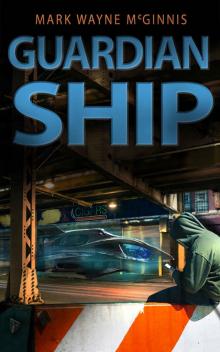 Guardian Ship
Guardian Ship Cloudwalkers
Cloudwalkers Mad Powers (Tapped In)
Mad Powers (Tapped In) Ship Wrecked
Ship Wrecked The Great Space (Scrapyard Ship Book 6)
The Great Space (Scrapyard Ship Book 6)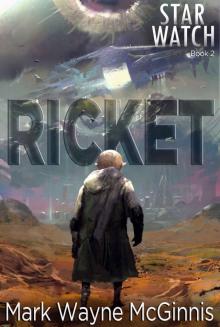 Ricket (Star Watch Book 2)
Ricket (Star Watch Book 2)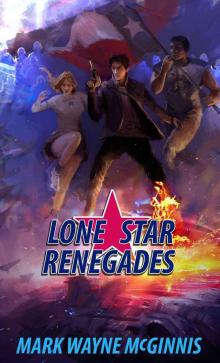 Lone Star Renegades
Lone Star Renegades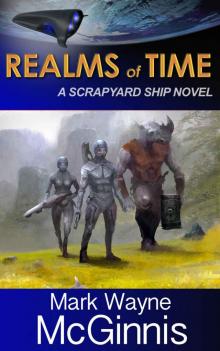 Realms of Time (Scrapyard Ship)
Realms of Time (Scrapyard Ship) Glory for Sea and Space (Star Watch Book 4)
Glory for Sea and Space (Star Watch Book 4) Scrapyard Ship 3 Space Vengeance
Scrapyard Ship 3 Space Vengeance Boy Gone
Boy Gone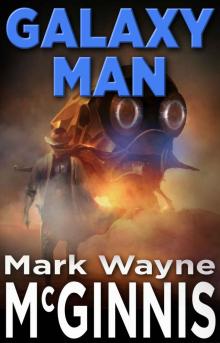 Galaxy Man
Galaxy Man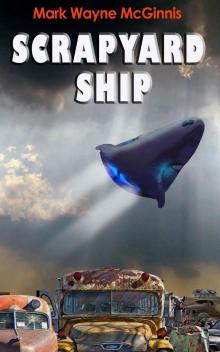 Scrapyard Ship
Scrapyard Ship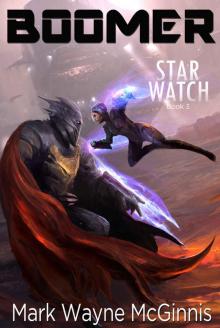 Boomer (Star Watch Book 3)
Boomer (Star Watch Book 3)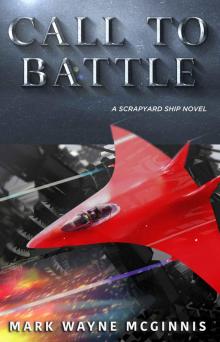 Scrapyard Ship 7: Call to Battle
Scrapyard Ship 7: Call to Battle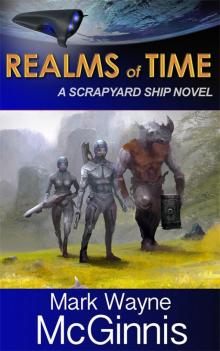 Scrapyard Ship 4 Realms of Time
Scrapyard Ship 4 Realms of Time Star Watch
Star Watch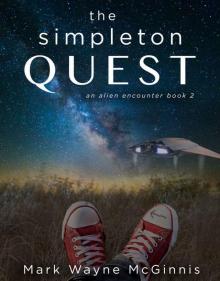 The Simpleton QUEST
The Simpleton QUEST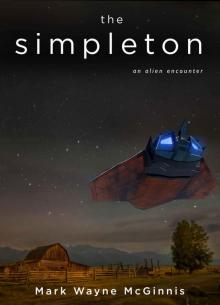 The Simpleton: An Alien Encounter
The Simpleton: An Alien Encounter Scrapyard LEGACY (Star Watch Book 6)
Scrapyard LEGACY (Star Watch Book 6) Ship Wrecked: Stranded on an alien world
Ship Wrecked: Stranded on an alien world